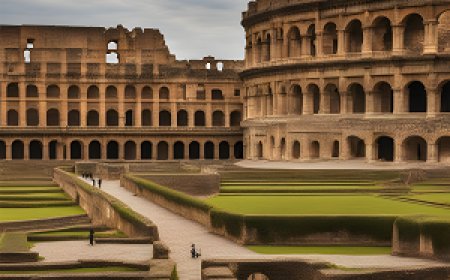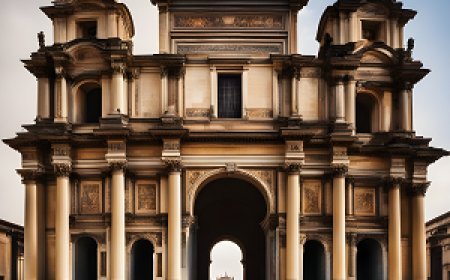Get to know Greek culture closely
Exploring Greek culture means diving into a world of greatness and beauty, where ancient history and profound philosophy intersect with stunning arts to form an unparalleled heritage. From the ancient myths that tell stories of gods and human heroism to the magnificent artistic innovations in architecture, literature, and philosophy, Greek culture stands out as a source of inspiration and expression of the human spirit across the ages.

Exploring Greek culture means diving into a world of greatness and beauty, where ancient history and profound philosophy intersect with stunning arts to form an unparalleled heritage. From the ancient myths that tell stories of gods and human heroism to the magnificent artistic innovations in architecture, literature, and philosophy, Greek culture stands out as a source of inspiration and expression of the human spirit across the ages.
Get to know Greek culture closely
Greek culture is one of the most influential and rich heritages in human history. Its roots date back to ancient times when Greece was a center of civilization and innovation in various cultural fields. We can take a deep look at the various aspects of this diverse and rich culture.
Firstly, we must consider the history of Greek culture, as Greece is considered the cradle of Western civilization. Greek culture has evolved since ancient times, witnessing periods of brilliance such as the Classical era that enriched the world with concepts of beauty, philosophy, and the arts.
Greek philosophy is an integral part of this culture, born in the Athenian school thanks to great minds like Socrates, Plato, and Aristotle. Their ideas and theories have shaped the Western mentality and continue to guide philosophical discussions to this day.
The Greek myths cannot be ignored as they form an essential part of this culture. The myths tell stories of gods, heroism, and adventures, serving as a source of inspiration for many artists and writers to this day.
The field of arts in Greek culture includes various artistic expressions such as sculpture, painting, music, and theater. Greek art is considered an expression of beauty, deep thought, and inspiration.
Additionally, Greek architecture is an important part of this culture, with magnificent buildings such as the Acropolis, the Parthenon, and other Greek temples that reflect the traditions and philosophy of ancient times.
In the literary field, Greek literature stands out with great works of poetry, prose, and theater, from Homer and Hesiod to classical writers and playwrights like Aeschylus and Sophocles.
The Greek cultural heritage leaves its mark on the world as a whole, continuing to inspire and influence modern cultures across the globe.
The river of wisdom and the source of thought
"The river of wisdom and the source of thought" in Greek culture refers to Greek philosophy, which originated and flourished in ancient Athens and became a major source of thought and wisdom in the Western world. This topic embodies the essence of Greek culture and its profound influence on philosophical and cultural thinking throughout history.
The river of wisdom and the source of thought began in ancient times with the emergence of great Greek philosophers such as Socrates, Plato, and Aristotle. Socrates symbolized wisdom and logical thinking, with his philosophy revolving around the search for truth, open debate, and questioning the fundamental concepts of life. Plato, on the other hand, founded the Academy in Athens and wrote numerous philosophical dialogues that addressed topics such as justice, beauty, and wisdom. From this river of wisdom emerged Plato's philosophy, famous for the idea of eternal ideas and the world of forms.
Aristotle, on the other hand, greatly contributed to the development of Greek and Western thought as a whole, with his ideas ranging from ethics and politics to physics and metaphysics. His philosophy relied on logic, experimentation, and critical thinking, and his ideas contributed to shaping the philosophy of later ages.
Through the river of wisdom and the source of thought, the influence of Greek culture is evident in shaping the fundamental concepts of life and Western philosophy. The heritage of Greek philosophers remains a source of inspiration for many philosophers and thinkers in modern times, as the river of wisdom and the source of thought continues to flow in the world of philosophy and thought.
Greek myths
Greek myths are an essential and significant part of ancient Greek culture, comprising a collection of oral stories and myths that span thousands of years and reflect ancient human perceptions of the world, theology, and humanity. Greek myths are among the oldest known myths in human history and are closely linked to ancient Greek culture and traditions.
Greek myths vary greatly and include stories about gods, heroes, mythical creatures, and historical events. The Greek gods are an important part of these myths, with ancient Greeks believing in the existence of gods such as Zeus, the king of the gods and god of the sky and thunder, Hera, his wife, Athena, the goddess of wisdom and war, Apollo, the god of arts and poetry, and others.
Greek myths carry stories of the heroics of figures like Heracles, Achilles, and Odysseus, who fight and adventure for honor, glory, and victory. The myths also include stories about mythical creatures such as sirens, nymphs, and cyclopes.
Greek myths reflect the values and beliefs of ancient Greek people and serve as a means of transmitting cultural and spiritual heritage between generations. Additionally, myths blend history, facts, and scientific explanations of natural phenomena, making them an integral part of Greek heritage and of cultures influenced by them.
Creations that tell the story of creativity and beauty
Creations that tell the story of creativity and beauty in Greek culture represent an essential part of the great cultural heritage left by the Greeks to the world. This topic refers to the diversity and richness of Greek culture in the fields of arts, sciences, and literature, and how this creativity reflects values of beauty and profound thinking that were part of ancient Greek life.
In the field of arts, Greek culture is characterized by amazing creations in sculpture, painting, and architecture. Greek sculptures are among the most important creations that tell the story of beauty and mastery, with magnificent sculptural representations of gods and human heroics. Greek architecture also stands out with its magnificent structures such as the Acropolis and massive temples that express the beauty of geometry and visual harmony.
In literature, Greek literary works are considered among the greatest creations that narrate the story of creativity and beauty. This includes the mythical poetry of Homer and his magnificent epics "The Iliad" and "The Odyssey," as well as classical playwrights' works like Aeschylus, Sophocles, and Euripides. These works vary between aesthetic description, philosophical expression, and dramatic representation, making them a mirror of Greek culture and deep thought.
Overall, the creations of Greek culture tell the story of creativity and beauty in a diverse and comprehensive manner, highlighting the importance of this cultural heritage in shaping thought, art, and science in the modern world.
Greek architecture
Greek architecture represents an important part of the rich cultural heritage of ancient Greece and has greatly influenced architectural development worldwide. Greek architecture is a source of inspiration for many cultures and civilizations around the world, reflecting values of beauty and harmony that were integral to the lives of the ancient Greeks.
Greek architecture is characterized by simplicity and precise geometric organization, featuring regular columns and harmonious geometric structures. The use of regular columns, such as Ionic, Doric, and Corinthian columns, is one of the prominent features of Greek architecture and reflects Greek culture and traditions.
Greek temples are renowned for their simplicity and aesthetic details, characterized by harmony and balance in design. For example, the traditional Greek temple consists of a rectangular sanctuary supported by columns at the front and sides, representing a magnificent example of simplicity and beauty in Greek architecture.
In addition to temples, Greek architecture also includes theaters, stadiums, and other public buildings. Greek theaters are distinguished by their circular design and amphitheater, allowing the audience to view performances from all angles. This design reflects the emphasis on providing a comfortable and enjoyable viewing experience.
Greek architecture is an integral part of Greek culture, reflecting the values and principles that were important to the ancient Greeks. The influence of Greek architecture continues in the modern world as a source of inspiration and appreciation for the beauty and harmony that can be achieved through architectural design.
Greek literature
Greek literature is an integral part of ancient Greek culture, representing a rich cultural heritage that serves as a source of inspiration and contemplation for many writers and thinkers around the world. The history of Greek literature extends from ancient times to modern times, encompassing a diverse range of literary works that include poetry, prose, and drama.
In ancient times, poetry held a prominent place in Greek life, and poets were esteemed figures in society. Among the most famous ancient Greek poets is Homer, who is considered the author of "The Iliad" and "The Odyssey," two of the greatest literary works in history. These works narrate epic stories of gods, heroics, and adventures, serving as a significant source for understanding Greek thought and culture.
In the realm of prose, Greek philosophers excelled in writing philosophical works that addressed topics such as justice, philosophy, and ethics. Plato is considered one of the foremost Greek philosophers, having written numerous dialogues that addressed themes of wisdom, justice, and beauty. Additionally, Aristotle contributed to the development of philosophy with his diverse ideas spanning areas such as ethics, politics, and physics.
In the field of drama, the Greeks created many of the most famous theatrical works in history. Playwrights like Aeschylus and Sophocles are among the most important figures in Greek theater, having written numerous plays that explored themes such as love, justice, and fate.
In this way, Greek literature is an essential part of Greek culture, reflecting its values, beliefs, and experiences through a wealth of literary works that continue to influence modern cultures to this day.
Inheritance of Greek Culture
The legacy of Greek culture represents a rich and diverse collection of traditions, arts, philosophy, and sciences that have greatly influenced the cultural development of the world as a whole. Greek culture is considered one of the most impactful civilizations in history, leaving deep imprints in various fields.
In the realm of philosophy, Greek philosophers are among the most significant thinkers in history, offering important contributions to understanding the world, humanity, and life itself. Greek philosophy tackled subjects such as existence, truth, beauty, and ethics, profoundly shaping the development of Western thought.
In the arts, Greek culture excelled in sculpture, painting, and architecture, creating magnificent works of art that express beauty and harmony. Greek sculptures, temples, and theaters are among the most important artistic creations left by the Greek civilization.
In literature, Greek poets and writers produced literary works that reflect human experiences, emotions, and dreams. Homer, the author of the "Iliad" and the "Odyssey," is one of the most important poets in history and is considered a symbol of ancient Greek literature.
Additionally, Greek culture influenced scientific fields such as mathematics, medicine, and astronomy, providing significant contributions that impacted the scientific advancement of humanity.
The legacy of Greek culture represents a significant cultural heritage for humanity, greatly influencing history, thought, art, and science. Greek culture serves as a source of inspiration and contemplation for many cultures around the world, and its effects continue to be renewed and felt in modern times.
Summary
Exploring Greek culture means delving into the rich and diverse cultural heritage that the Greek civilization has left to the world. This culture encompasses various fields such as philosophy, arts, literature, and sciences. Greek philosophers are among the most important thinkers in history, contributing to the development of philosophy and a deep understanding of the world. Greek culture is also distinguished by magnificent arts such as sculpture, painting, and architecture, as well as epic and poetic literary works that express human experiences and emotions. Thanks to this rich heritage, Greek culture remains a source of inspiration and contemplation for many cultures around the world in modern times.
Sources
1. Ancient Greek Civilization from the Qatar Digital Library
2. Greek Culture: A Civilization Story from the Encyclopedia Britannica
3. The Impact of Greek Civilization on Western Culture from Heritage Magazine
What's Your Reaction?
















































































































